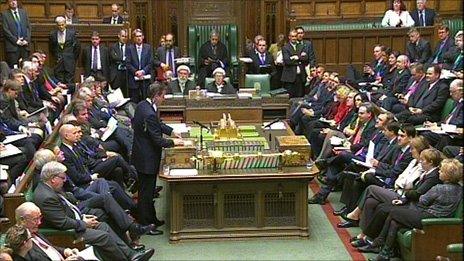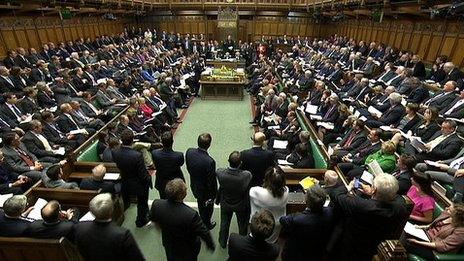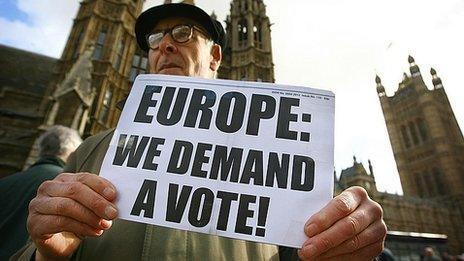EU referendum: Cameron says no bad blood towards rebels
- Published
- comments
PM David Cameron: 'There is no bad blood and no bitterness'
David Cameron has said he has "no bad blood" towards Conservatives who defied orders to oppose a call for a referendum on the UK's EU membership.
Ministers won the vote but 81 Tories backed the call, the biggest rebellion on Europe against a Conservative PM.
The prime minister said he knew people felt "strongly" about the issue but he had to "give a lead" on the issue.
Some Conservative MPs were annoyed that the party imposed a three-line whip on a backbench motion.
Asked whether he regretted the order - which meant any Conservative MP who voted against the government would be expected to resign from government jobs - he said: "No I don't, in politics you have to try to confront the big issues, rather than try to sweep them under the carpet and that's what we did yesterday."
'Valued colleagues'
He said Europe had always been a difficult issue for the Conservatives and "always will be" but he had to do the right thing for the country.
"It wouldn't be right for the country right now to have a great big vote on an in-out referendum," he said.
"There's no, on my part, no bad blood, no rancour, no bitterness. These are valued Conservative colleagues, I understand why people feel strongly and we will go forward together and tackle the difficult decisions the country faces."
The backbench motion - prompted after a petition was signed by more than 100,000 people - was defeated by 483 votes to 111, after all Tory, Lib Dem and Labour MPs had been instructed to oppose it.
It called for a referendum on whether the UK should stay in the EU, leave it or renegotiate its membership - but even if the government had lost, it would not have been obliged to hold a referendum.
However Mr Cameron urged his MPs to vote against it arguing that, with a "crisis" in the eurozone any legislation for a referendum now "could cause great uncertainty and could actually damage our prospects of growth".
But almost half of his backbenchers appear to have ignored his calls.
In total 81 Conservative MPs, including two acting as tellers (the name given to the MPs who count the votes) supported the referendum motion and two more MPs - Mike Wetherley and Ian Stewart - actively abstained by voting both yes and no.
A further 12 MPs did not vote - although that figure includes Foreign Secretary William Hague, who put the government case against the motion before having to leave the debate early to travel to Australia, and another minister Mike Penning, who was in China.
It was the biggest rebellion against a Conservative prime minister over Europe - the previous largest was in 1993, when 41 MPs defied John Major on the Maastricht Treaty.
'United'
Labour leader Ed Miliband described the result as "a humiliation for the prime minister": "If he can't win the argument with his own backbenchers, how can the country have confidence that he can win the arguments that matter for Britain?"
But Education Secretary Michael Gove told the BBC: "It's not a humiliation."
He said that while there were a "significant number" of rebels - the differences between them and the Conservative frontbench were not significant.
"It was a very precisely worded motion which allowed a number of people like myself, who are passionate Eurosceptics, to say: Look, I disagree with the tactics but we agree on the ultimate goal."
He said the prime minister was "committed" to taking back powers from Europe to boost economic growth in the UK.
Tory rebel Mark Pritchard, who voted against the government yesterday, says policy definition is needed on Europe.
Deputy Prime Minister Nick Clegg said Lib Dems, traditionally the most pro-European of the three biggest UK parties, would not let Britain be pulled to the margins of the European Union.
The Lib Dem leader warned Conservative rebels against what he called a "smash and grab raid" on Brussels.
"You reform and change Europe by leading it, not by leaving it. Each step of the way, the question should be, what can we get out of Europe, not how can we get out of Europe? I think the Eurosceptics need to be a little bit careful about what they wish for.
"Let's be under no illusions. Every step closer to the exit sign shakes confidence in the British economy and can hit British jobs."
The BBC's political editor Nick Robinson said the deputy PM's comments had poured salt on Mr Cameron's wounds.
The Conservative rebels included two Parliamentary private secretaries, Stewart Jackson and Adam Holloway - Downing Street has since confirmed both had been "removed" from the unpaid roles.
One Liberal Democrat MP, Adrian Sanders, defied his party's leadership and voted for a referendum.
Nineteen Labour MPs rebelled, including Frank Field, Kate Hoey, Jon Cruddas and Graham Stringer. Caroline Lucas, the only Green MP in the Commons, also voted for the motion, as did all eight DUP MPs and independent Lady Sylvia Hermon.
Senior Conservative backbencher Mark Pritchard said Tory MPs wanted "clarity" about how the government planned to repatriate powers from Europe, or the government's position would become "politically unsustainable".
"The Conservative Party will move on from the vote last night but I do not think Europe as an issue is going to move on from this Parliament.
"It is going to be more rather than less of an issue."
- Published25 October 2011

- Published25 October 2011
- Published25 October 2011
- Published25 October 2011
- Published25 October 2011

- Published21 May 2015

- Published20 October 2011
- Published18 October 2011